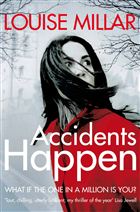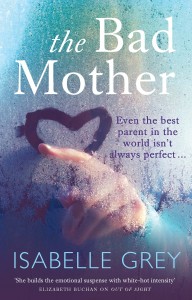 Accidents Happen by Louise Millar published by Pan
Accidents Happen by Louise Millar published by Pan
The Bad Mother by Isabelle Grey published by Quercus
Traitor’s Gate by Michael Ridpath published by Head of Zeus
Two of the perennial themes in crime fiction are the mother whose child disappears and the threatened woman who is told she’s imagining the danger she feels all round her. Some men write about these, but the authors are more often women. Celia Fremlin’s first (and Edgar-winning) novel, The Hours Before Dawn, was published in the UK in 1958 and is an early example of the threatened woman whose friends and family think she’s mad. Sophie Hannah has used the same idea to great effect ever since her first novel, Little Face (2006), and she now has many imitators. Like most crime fiction, this is designed to reassure, showing how the heroine has had right on her side all along and will see her doubters forced to grovel in apology. These novels clearly answer a continuing need in many women, who have been mocked or disbelieved by those who should have listened.
Now we have Louise Millar’s Accidents Happen. Millar’s Kate Parker suffers from such atrocious anxiety that her young son has to hide the titchy risks he takes in case knowledge of them sends her right over the edge. Already her in-laws think she’s suffering from a mental illness, and they encourage him to ride his bike to the local shops on his own and commit other small rebellions against her constraining rules. She knows all the statistics for accidents and crime, trotting them out at every opportunity. She has even had a steel cage constructed in her bedroom so that when her fears assume human form and attack, as she’s certain they will, she and her son can lock themselves in the cage. Kate is no pushover: she fights her delusions as hard as she can. When her scent and moisturiser seem to have been more depleted than they should be, for example, she persuades herself she’s imagining it and battles on.
When she finds a man who shows much more understanding of her difficulties than any of her family, it is clear that he will bring some new threat of his own, but she doesn’t see that in time, and all kinds of trouble ensue. For me the set-up was more convincing than the revelation of the reasons behind Kate’s torment, but the narrative is well constructed and the precise outcome is kept in doubt for long enough to ensure complete attention.
 Isabelle Grey has taken the other familiar theme and, without following the rules and patterns of crime fiction, shows exactly why her scripts for so many crime dramas, including one of Jimmy McGovern’s Accused last year have been so successful. In The Bad Mother Grey describes an ordinary family living in an ordinary English seaside town. Tessa Parker runs a boutique bed-and-breakfast, is on reasonable terms with her estranged partner Sam and does her best with her teenage children, Mitch and Lauren. A stranger appears and threatens the carefully constructed security, although it is not immediately clear that this will prove to be any more than an emotional upheaval.
Isabelle Grey has taken the other familiar theme and, without following the rules and patterns of crime fiction, shows exactly why her scripts for so many crime dramas, including one of Jimmy McGovern’s Accused last year have been so successful. In The Bad Mother Grey describes an ordinary family living in an ordinary English seaside town. Tessa Parker runs a boutique bed-and-breakfast, is on reasonable terms with her estranged partner Sam and does her best with her teenage children, Mitch and Lauren. A stranger appears and threatens the carefully constructed security, although it is not immediately clear that this will prove to be any more than an emotional upheaval.
The adolescent Mitch is beautifully drawn in all his angry, yearning uncertainty as he acquires his first girlfriend and challenges her immensely rich and all-powerful father. When the boy disappears, there are many possible causes and outcomes, and Grey both stretches the tension and keeps her story realistic until the denouement. This is a moving novel, as a well as a convincing one, and it shows with great clarity how past crimes and well-meaning manipulation damage families for years afterwards.
Michael Ridpath, who has moved from crimes in the City to murder inIceland, now takes us back to Berlin just before the Second World War and one of the first plots against Hitler. As Ridpath explains in a note at the end, he has based his story on the real plot ‘transmitted to the British government….by Ewald von Kleist with the help of a young, well-connected British journalist name Ian Colvin’.
In the novel, the British government is still trying to appease Hitler and there are many influential British people who are not entirely convinced that he’s a bad thing. But Conrad de Lancey knows better. He comes from a British county family with many German relations and has just emerged from dreadful experiences in the Spanish Civil War. He is a fluent German speaker and a lover of the country as it was before Hitler’s rise. Conrad’s slightly naïve decency, and almost incredible courage, are challenged as he discovers quite how brutal the new regime inBerlinhas become.
 On the way to his ultimate disillusion and subsequent triumph, he falls in love, then is forced to doubt his beloved as much as all his old friends and relations, showing precisely why life in a society ruled by a secret and corrupt force such as the Gestapo makes any normal kind of relationship impossible. When you cannot trust anyone not to betray you into the hands of torturers, you can never reveal your real self and therefore you can never know or be known. Such a society – whatever its politics – will always collapse in the end because it frustrates a fundamental psychological need.
On the way to his ultimate disillusion and subsequent triumph, he falls in love, then is forced to doubt his beloved as much as all his old friends and relations, showing precisely why life in a society ruled by a secret and corrupt force such as the Gestapo makes any normal kind of relationship impossible. When you cannot trust anyone not to betray you into the hands of torturers, you can never reveal your real self and therefore you can never know or be known. Such a society – whatever its politics – will always collapse in the end because it frustrates a fundamental psychological need.
All three of these novels deal with fears that are part of the human condition, and the journeys their main characters have to take through danger into restored security provide just the kind of reassurance for which we all yearn.
